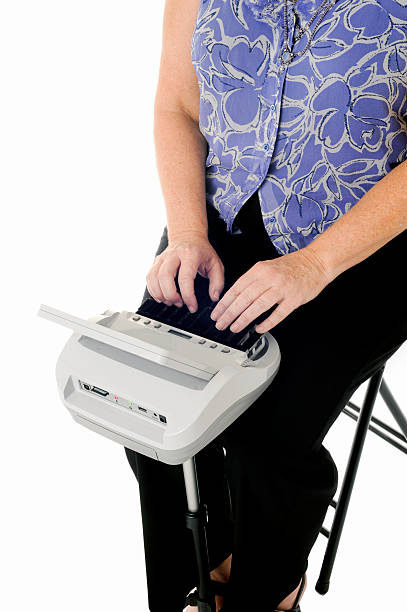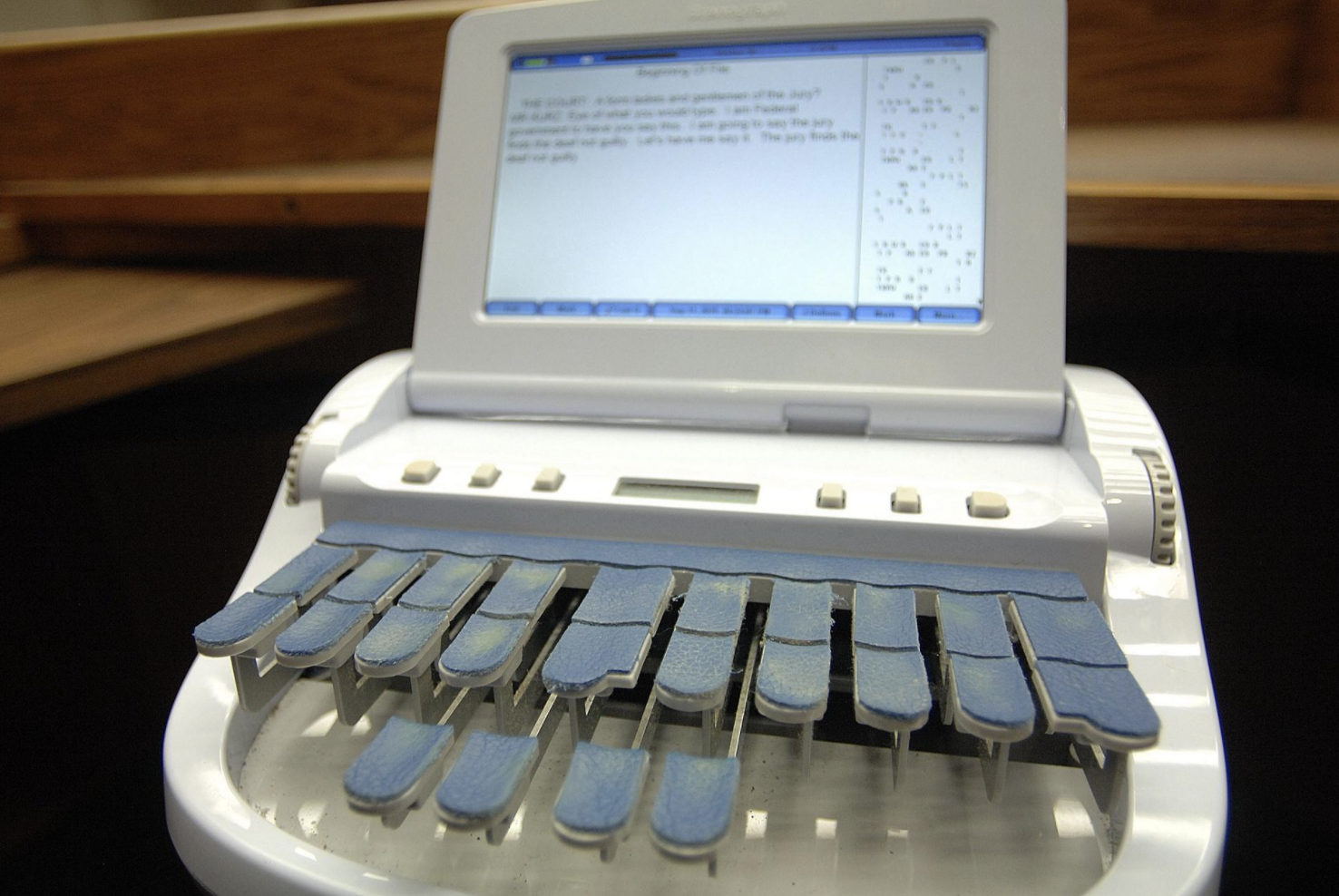A Day in the Life of a Working Court Typist
A Day in the Life of a Working Court Typist
Blog Article
Understanding the Role of a Court Typist: Secret Duties and Profession Path Insights
As a court typist, you play a vital role in the judicial system, making sure that every word talked in court is accurately recorded. Your obligations go beyond simply keying; they entail taking care of sensitive papers and maintaining strict discretion. Comprehending your responsibilities is essential to steering with this career properly. Yet what certifications and abilities do you really need to succeed, and what profession courses can you seek? Allow's check out.
Introduction of the Court Typist Role
A court typist plays an essential duty in the lawful system, making sure that all talked process are properly recorded. You're the one who catches the subtleties of courtroom dialogue, translating verbal exchanges right into written documents - court typist. This isn't just regarding inputting; it has to do with grasping the intricacies of legal language and procedures. You frequently function under stress, needing to keep focus while target dates loom.Your attention to information is extremely important, as even the smallest mistake can have considerable implications. You have to additionally be familiar with the technology made use of in courtrooms, from dictation tools to transcription software.Moreover, you belong to a bigger team, working together very closely with judges, legal representatives, and other court authorities. Your work adds to the openness and honesty of the judicial process. Comprehending your role helps you appreciate the effect you carry making sure justice is served via exact documentation
Key Duties of a Court Typist
While you may believe the role of a court typist is entirely regarding typing, it includes a variety of essential obligations that assure the lawful procedure runs efficiently. You'll be in charge of transcribing trials, hearings, and depositions accurately, ensuring every information is captured. You'll additionally review and check documents for mistakes, keeping a high level of precision and clarity.In addition to transcription, you'll organize and submit lawful documents, making them conveniently accessible for courts and lawyers. You might need to help in preparing situation documents and upgrading records as required. Efficient communication is important, as you'll usually collaborate with lawful personnel to clarify details or gather necessary details.Your duty additionally consists of handling due dates, so prompt completion of records is crucial. By satisfying these responsibilities, you play a vital part in making sure and sustaining the judicial system that legal process are documented properly.
Necessary Abilities for Court Typists
Successful court typists have an one-of-a-kind collection of skills that boost their ability to execute effectively in a busy legal setting. First and leading, solid inputting abilities are important; you'll need to type rapidly and accurately to stay on top of court process. Interest to information is important, as even minor mistakes can have significant consequences.You needs to also have a strong understanding of legal terminology, which enables you to precisely maintain and transcribe documents clearness. Excellent business abilities are vital for taking care of numerous instances and making sure deadlines are met.Moreover, excellent interaction skills aid you engage efficiently with judges, lawyers, and various other court personnel. Ultimately, adaptability is crucial; you'll usually experience unanticipated situations that need quick reasoning and analytic. By refining these crucial abilities, you'll position on your own for success as a court typist in the legal field.
Educational Accreditations and Educating

To come to be an effective court typist, you'll need a solid educational history, commonly consisting of a secondary school diploma or equivalent. Pertinent inputting qualifications can improve your credentials and improve your task prospects. In addition, on-the-job training opportunities can help you gain the sensible abilities necessary for this role.
Vital Educational Background

Pertinent Entering Qualifications
While having a strong academic structure is essential, getting relevant inputting accreditations can greatly improve your qualifications as a court typist. Accreditations like the Qualified Professional Secretary (CPS) or the Registered Professional Assistant (RPS) demonstrate your proficiency and dedication to the profession. These qualifications not just confirm your typing rate and precision however likewise showcase your understanding of lawful terms and document format important in court settings. Additionally, going after specialized courses in lawful transcription can better fine-tune your abilities, making you a much more competitive candidate. By purchasing these accreditations, you reveal prospective employers your commitment to excellence and your readiness to handle the demands of a court typist role effectively. This aggressive approach can profoundly boost your career leads.
On-the-Job Training Opportunities
As you commence your trip to become a court typist, on-the-job training provides important experience that complements your official education. You'll likely start in a helpful function, tailing experienced typists and discovering the ropes of court procedures, terminology, and software program. This hands-on experience aids you create essential skills, such as accurate transcription and time management.Many courts offer organized training programs that permit you to practice under real conditions, boosting your confidence and effectiveness. You'll also obtain accustomed to various legal records and courtroom methods, offering you an advantage in your job. Welcome these chances, as they'll not only refine your inputting skills yet likewise build your professional network within the legal area, establishing you up for future success.
Occupation Course and Improvement Opportunities
Court typists commonly locate themselves on an encouraging profession path with numerous advancement visit the site opportunities. As you gain experience and improve your abilities, you could move right into functions like lead typist or supervisor, overseeing a team of typists. With further training, you can concentrate on lawful transcription or court reporting, which generally offers greater salaries and better responsibilities.You could also take into consideration seeking certifications that can set you in addition to the competitors. Connecting with lawful professionals can open doors to advanced positions, such as administrative functions in law office or notary positions.As you proceed to construct your know-how in lawful terms and innovation, possibilities in associated fields like legal assistant job or legal aid may also emerge. By being proactive and looking for additional training, you can considerably increase your profession options and potentially shift into higher-level lawful functions.
The Importance of Accuracy in Legal Transcription
Because even a small error can modify the significance of a document, accuracy in legal transcription is crucial. When you're transcribing, your accuracy directly affects court procedures and can affect the outcomes of situations. By utilizing the right tools, you can improve your precision and warranty that every information is captured appropriately.
Precision in Lawful Papers
When you assume about the legal system, the precision of files often makes the difference in between an instance shed or won. As a court typist, you are accountable for recording lawful proceedings with absolute accuracy. Every word, spelling mark, and formatting detail matters. A single mistake can cause misunderstandings, false impressions, or perhaps endanger a customer's instance. You need to stay concentrated, listen diligently, and have a complete understanding of legal terms. Furthermore, keeping discretion is important, as you manage delicate info. Your role isn't just about inputting; it has to do with guaranteeing the honesty of lawful records. By honing your skills and focusing on accuracy, you add substantially to the efficiency of the legal system and the quest of justice.
Influence On Court Process
The success of court procedures rests on the precision of legal transcription. Every word counts when you record court hearings. A single mistake can result in misunderstandings, influencing the end result of instances. If you misinterpret an important declaration or misspell an essential term, it can transform the whole context of the discussion. Juries, lawyers, and courts depend on your job to make educated decisions based on the proof presented. Your attention to detail assurances that the official document shows truth proceedings, supplying clearness and responsibility. By preserving high standards in your transcription, you add greatly to the stability of the lawful procedure. Ultimately, your duty is vital in upholding justice and guaranteeing that every voice is properly stood for in court
Devices for Accurate Transcription
To toenail accurate transcription in the court room, you need the right devices at your fingertips. A premium transcription software can substantially boost your effectiveness, allowing you to catch every word specifically. Buy a trustworthy headset to filter out history sound and guarantee quality in audio recordings. A foot pedal can also quicken your process, allowing you control playback hands-free. In addition, preserving an extensive lawful thesaurus or reference assists you swiftly reference terminology, ensuring you don't miss out on key information. It's vital to have a comfy, ergonomic workstation to lessen interruptions and exhaustion throughout lengthy sessions. By furnishing yourself with these vital tools, you'll improve your precision and add successfully to the legal procedure.
Job Atmosphere and Work Overview for Court Typists
Court typists grow in vibrant settings, often located within legal offices or dynamic court houses. You'll discover yourself bordered by lawyers, from legal representatives to judges, all collaborating to guarantee justice is served (court typist). Your work area might be busy, requiring you to adapt quickly to differing demands, whether it's recording court procedures or preparing legal documents.As for the task expectation, the demand for court typists stays stable because of the ongoing requirement for specific documentation in legal settings. While modern technology has automated some transcription tasks, experienced court typists who can handle complex legal terms and keep accuracy are still highly valued. Several typists likewise have opportunities for advancement within the lawful area, developing right into functions such as legal assistants or link management aides. Your interest to information and capability to function under pressure will certainly be vital for your success in this considerable function
Frequently Asked Concerns
What Equipment or Software Do Court Typists Normally Use?
Court typists usually utilize transcription software application, word processing program like Microsoft Word, and specialized court reporting devices. You'll also depend on foot pedals and top quality headsets to improve precision and effectiveness in your transcription jobs.
Exactly How Does One Discover Job Openings for Court Typists?
To discover task openings for court typists, examine online work boards, lawful web sites, and court system job pages. Connecting with specialists in the area can likewise cause unadvertised opportunities you might not uncover otherwise.

What Is the Ordinary Wage for a Court Typist?
The typical income for a court typist varies look at this site by place and experience, yet you can anticipate it to range from $35,000 to $55,000 each year. Research regional task listings to get a far better feeling of salaries.
Exist Certifications Available for Court Typists?
Yes, there are accreditations offered for court typists. You can seek professional courses that enhance your abilities, like lawful transcription or court reporting certifications, which can boost your career possibilities and trustworthiness in the area.
Can Court Typists Work Remotely or Freelance?
Yes, court typists can function remotely or freelance, particularly with advancements in modern technology. You'll locate opportunities in transcription services or lawful firms that permit flexible work setups, adjusting to your timetable and choices. As a court typist, you play a vital duty in the judicial system, ensuring that every word talked in court is accurately caught. Networking with lawful specialists can open doors to more innovative settings, such as management duties in regulation firms or court clerk positions.As you proceed to construct your know-how in lawful terminology and innovation, opportunities in relevant fields like paralegal work or lawful help may also emerge. Your office might be busy, needing you to adjust swiftly to differing needs, whether it's transcribing court process or preparing legal documents.As for the task outlook, the demand for court typists continues to be steady due to the ongoing requirement for exact documents in legal settings. Court typists typically make use of transcription software program, word cpus like Microsoft Word, and specialized court coverage devices. To discover work openings for court typists, check on the internet work boards, legal websites, and court system job pages.
Report this page